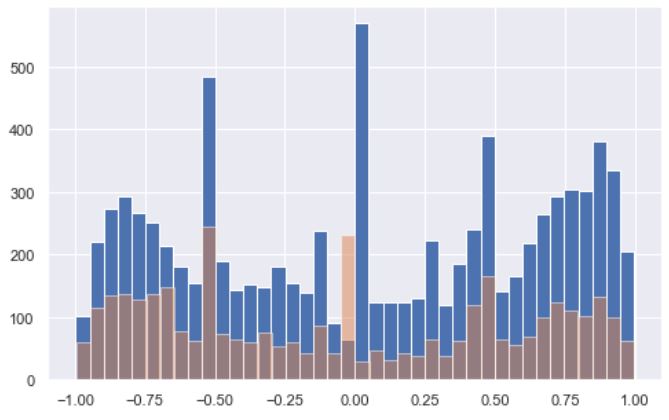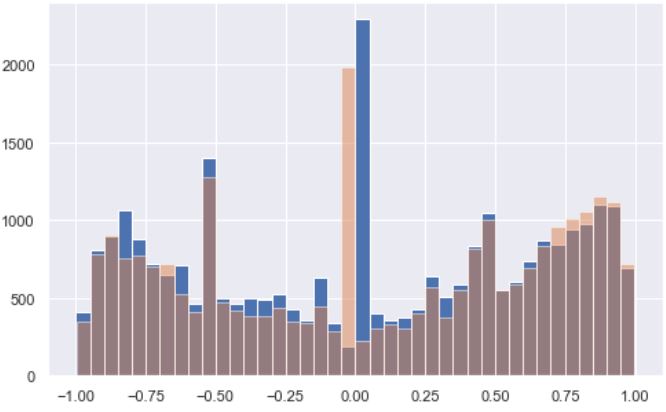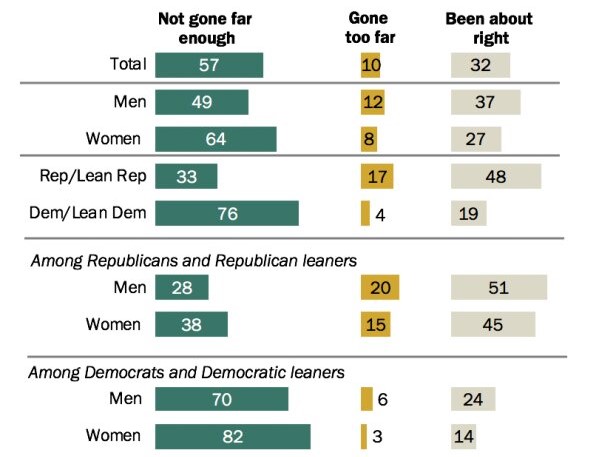It may be relevant to find out what types of speakers relies on such arguments as gender equality and how it is appearing in their quotations. In particular, we would like to grasp, the global opinion the speakers may have depending on their political party or gender. We support this study by a sentiment analysis using Vader on different split of the quotations (splitting by political party or by gender).
Is Women’s Rights a source of disagreement between political parties ?

Fig.4.1 - Distribution of sentiment scores among US politicians - in red: the Republicans, in blue: the Democrats
By splitting Quotebank’s quotes according to the political party, we do not observe any notable difference in the average sentiment of the speaker in their quotes dealing, directly or indirectly, with Women’s Rights. Still, what is remarkable is that the Democratic party seem to have refered to it more often during the period studied.
Here we cannot conclude that political parties in the U.S. doesn’t seem to hesitate showing their disapproval with the Women Rights or anything link to that topic can be both sad or happy in either case.
Is Women’s Rights a source of disagreement between the two sexes ?

Fig.4.2 - Distribution of sentiment scores between men and women - in red: men, in blue: women
It is also informative to study whether women have a different opinion that men and whether they convey different emotions in their quotes dealing directly or indirectly with Women’s Rights. Using Quotebank’s quotations, we have noticed that it is not possible to distinguish the speakers solely on basis of their gender.
However, we must be careful not to rule out the possibility that the very fact that a person is in the database makes them probably well-known and can act as a confounder for our analysis. That is why we canot conclude that people’s opinion on Women’s Rights does not depender on their gender.
Discussion on the Sentiment Analysis task using Vader
Let us compare our observations with some stats from the Pew Research Center:
«««< HEAD

Fig.4.3 - Different opinions on Women’s Rights - source: the Pew Research Center
=======
<img src = https://raw.githubusercontent.com/unesmu/unesmu.github.io/master/assets/img/clivage_political_gender.jpg>
Fig.4.3 - Different opinions on Women's Rights - source: the Pew Research Center
529b8bf83bbd53683a4fcbcecee874a4241b3650
Women (64%) are more likely than men (49%) to say the country hasn’t made enough progress on gender equality. However, there is also a sizable party gap. Roughly three-quarters of Democrats (76%) say the country hasn’t gone far enough when it comes to giving women equal rights with men, compared with 33% of Republicans.
Our analysis doesn’t seem too picture such a clivage between political parties and gender in the U.S. Two hypotheses come to us:
-
Quotebank database doesn’t generalize well as it does not depict such disparities among the speakers.
-
The sentiment analysis we carried out is coarse-grained and does not take into consideration all the nuances of the speakers such as anger or fear.
As a further study we could invistigate using other tools for sentiment analysis (like Flair or TextBlob).